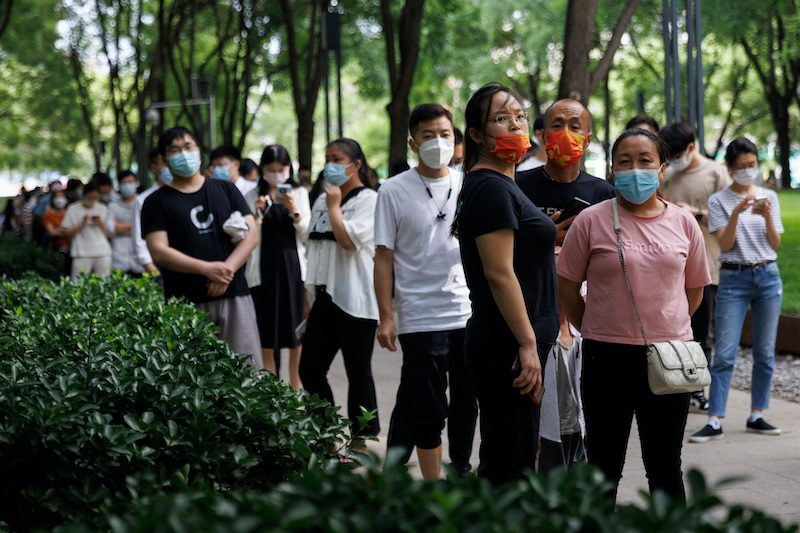China’s economic slowdown worsened in July as Covid lockdowns and a debt crisis that’s roiling the property industry dragged back growth, prompting unexpected rate cuts by the central bank that analysts said are too small to stem the slide.
Property investment tumbled almost 12% in July while industrial output growth and retail sales slowed. Employment remained fragile with the survey-based nationwide jobless rate easing to 5.4% while youth unemployment climbed to a record 19.9%. In response, the People’s Bank of China trimmed its one-year and seven-year lending rates by 10 basis points each, to 2.75% and 2%, respectively.
“Beijing’s policy support could be too little, too late and too inefficient,” said Lu Ting, chief China economist at Nomura Holdings in Hong Kong. “We think markets are too optimistic about growth in the second half, and we expect a new round of cuts of growth forecasts in coming weeks.“
China New Bank Loans Plunge in July, Point to Weak Second Half
Industrial output grew 3.8% in July from a year earlier, according to the National Bureau of Statistics (NBS), below the 3.9% expansion in June and a 4.6% increase expected by analysts in a poll. Retail sales rose 2.7% from a year ago, missing forecasts for 5% growth and the 3.1% growth seen in June.
The grim set of figures indicates the world’s second-largest economy is struggling to shake off the June quarter’s hit to growth from strict Covid restrictions, prompting some economists to downgrade their projections.
“Deceleration resumed across the board, from production to investment and consumption, under the crushing weight of the zero-Covid policy and housing woes,’’ wrote Yao Wei and Michelle Lam, China economists at Societe Generale. “The [rate] cut shows that policymakers still care about growth, just not much.’’
The economists said their forecast of 2.7% growth this year, among the lowest forecasts, “may still prove too optimistic.’’ July’s trajectory points to growth of less than 2% if policymakers remain slow to ease, they added.
Property Investment Tumbles
The property sector, which has been further rocked by a mortgage boycott that weighed on buyers’ sentiment, deteriorated in July. Property investment tumbled close to 12%, the fastest rate this year, while the drop in new sales deepened close to 29%.
New yuan loans also tumbled by more than expected in July as companies and consumers stayed wary of taking on debt, data showed on Friday.
“The July data suggest that the post-lockdown recovery lost steam as the one-off boost from reopening fizzled out and mortgage boycotts triggered a renewed deterioration in the property sector,” said Julian Evans-Pritchard, senior China economist at Capital Economics. ”The People’s Bank of China is already responding to these headwinds by stepping up support… But with credit growth proving less responsive to policy loosening than in the past, this probably won’t be sufficient to prevent further economic weakness.”
The world’s second-biggest economy narrowly escaped a contraction in the June quarter, hobbled by Covid lockdowns, a deepening downturn in the property market and persistently soft consumer spending. Drags on growth abound as many Chinese cities, including manufacturing hubs and popular tourist spots, imposed lockdown measures in July after fresh outbreaks of the more transmissible Omicron variant.
ALSO SEE: China Mortgage Revolt May be Death Blow for Private Builders
Weak Demand
“All economic data disappointed in July, with the exception being exports,” said Nie Wen, Shanghai-based economist at Hwabao Trust, adding that heatwaves in July also weighed on activity. “Loan demand from the real economy remained weak, suggesting a cautious outlook for the months ahead,”
Nie lowered his forecast for growth in the current quarter by 1 percentage point to 4-4.5%. The economy is widely expected to miss its official growth target this year – set at around 5.5% – for the first time since 2015.
Fixed asset investment, which Beijing had hoped would drive growth in the second half, grew 5.7% in the first seven months of the year from the same period a year earlier, versus a forecast 6.2% rise and down from a 6.1% jump in January-June.
“We are now facing a typical liquidity trap problem,” said Wang Jun, director at China Chief Economist Forum. “No matter how loose the credit supply is, companies and consumers are cautious in taking on more debt. Some of them are now even paying back their debt in advance. This may herald a recession.”
- Jim Pollard, Reuters
ALSO SEE: Five China State-Owned Companies to Delist from NYSE
Shanghai to Reopen All Schools Next Month, With Daily Testing
























